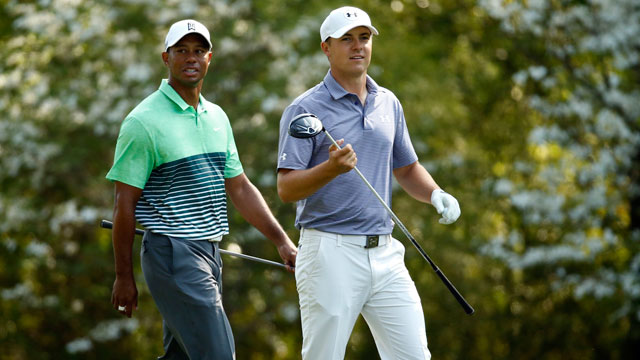NEWS
Opposite directions for Jordan Spieth and Tiger Woods in 2015
By Dan O'Neill
Published on

ST. LOUIS – The 2015 PGA Tour season has come to a fitting conclusion, literally and figuratively.
Jordan Spieth conducted a putting clinic and won the Tour Championship last weekend, collecting a record payout of more than $12 million, becoming the first to win $22 million in one season, or a million for each birthday.
Days earlier, Tiger Woods revealed he underwent more back surgery, a compelling contrast. There is a metaphorical transition there that is hard to miss. Even Jared Cook would catch it.
Both Spieth and Woods had remarkable years. Spieth went off, won the Masters, then the U.S. Open, then nearly the British Open. He was a record 54 under par in the four majors. He put a single-season Grand Slam on the table, put the golf division of Under Armour on the map and put caddie Michael Greller in the upper tax bracket for the rest of his life. And that all happened before he won in Atlanta.
Spieth has been the most refreshing, inspiring story for golf in a long time. In a sports world where relationships between those who play and those who follow get ever more measured and contentious, Spieth is a breathalyzer.
Earl Woods once referred to his son Tiger as a "Messiah"; one might argue Spieth fits the bill. He looks like the boy next door and more important, he acts like the boy next door. He minds his P's and Q's, deflects credit to others, brings a sense of honesty and humility to the game and the professional sports scene in general.
When he made a hole-in-one at the BMW Championship, Spieth sent a boatload of pizzas and beer to the press tent and more goodies to the volunteer tent. When he clinched the Tour Championship on Sunday, the first to hug him was 14-year-old Ellie Spieth, who has a neurological disorder linked to severe autism.
The $22 million man made sure everyone understood who was special. Ellie isn't his sister, it's the other way around. "Being Ellie's brother humbles me every day of my life," Spieth said.
Spieth is the runaway player of the year, but he wasn't the only vibrant story. He shared the feel-good stage with young talents like PGA Championship winner Jason Day and Deutsche Bank Championship winner Rickie Fowler. Like Spieth, they tend to operate as members of the general population, grounded, accessible.
Woods projected a starkly different persona as he won 14 majors and 79 PGA Tour events. It was his world, a world we couldn't possibly understand, a world he wasn't inclined to share. The image atop the leaderboard was affectless, insulated and untouchable.
In 2015, the most accomplished player of his generation, the reason someone might earn as much as $22 million in a season, descended deeper into a career abyss. Coming back from 2014 back surgery, Woods was to his former self what George Clooney was to Batman, Curly Joe was to Curly, Dennis Miller to Don Meredith ... a poor likeness.
Woods played in 12 events, missed the cut in four and withdrew in another. After a tie for 17th at the Masters, he missed cuts in the last three majors. His best week was a tie for 10th at the Wyndham Championship, an event won at 17 under par by 51-year-old Davis Love III. Since his last major win in 2008, Woods has had 11 incidents of injuries or physical breakdowns. The most recent is the second surgery on his back. Given his performance after the previous operation, the circumstances are especially daunting.
Woods turns 40 in December. When he might be capable of playing again is up in the air. When he might be "Tiger Woods" again has become almost silly to ponder. It appears he is back at square one, and it has become harder to believe the damaged Woods can ever recapture the past.
At the same time, Spieth will be hard-pressed to maintain his No. 1 ranking and spectacular success. In terms of ball-striking, players like Day and Fowler are superior. Spieth does everything well, but relative to the competition, he doesn't do anything especially well – except on the greens.
One might argue putting is the least physically challenging skill in the game and the most mentally demanding. Even the worst player in a scramble group might make a putt. But on the professional level, rolling the ball is mentally suffocating.
To do it under pressure as consistently well as Spieth, do it in a manner that demoralizes opponents and wins championships, is rare. There have been other great putters – Ben Crenshaw, Bobby Locke, Brad Faxon – but they didn't win like Spieth. There have been other great champions who putted lights out when it counted most – Woods, Jack Nicklaus, Bobby Jones – but they were extraordinary in other facets of the game.
Spieth might remind some of Billy Casper, who won 51 Tour events and beat Ben Hogan at the 1959 U.S. Open. Spieth brings back the notion that golf isn't all about power. He prepares, develops a strategy and executes. He thinks his way around and delivers at the money end, with cool confidence and uncanny touch.
Whether Woods can ever come back, whether Spieth can keep it up are two big questions going into next year. After a fabulous 2015, can't wait for the answers.
This article was written by Dan O'Neill from St. Louis Post-Dispatch and was legally licensed through the NewsCred publisher network.
